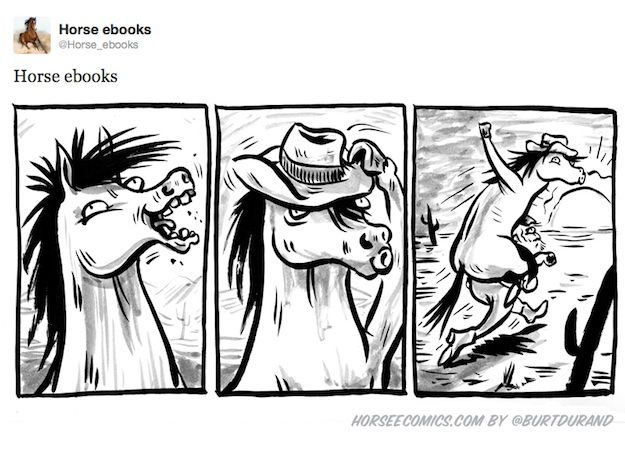Ripples of shock went through a certain portion of the Twitter/Tumblr/webcomics world Tuesday with the revelation, delivered by Susan Orlean at The New Yorker, that the @Horse_eBooks Twitter is not spam after all, but rather a work of conceptual art. The news also spelled the end of the webcomic based on that Twitter account, Horse_eComics. And a couple of sharp observers just earned some extra coolness points for catching on two years ago that something was off about the whole thing.
@Horse_ebooks was originally, as the name suggests, the Twitter for an e-bookstore that specialized in horses, one of about 170 spam Twitter accounts maintained by a Russian entrepreneur, let's call him, named Alexei Kouznetsov. In January 2012, John Herrman wrote a post explaining how @Horse_eBooks worked: Some of the tweets were links to accounts on Clickbank, an affiliate marketing site, while the others were random bits of text that were basically there to fool the Twitter spam detectors.
Originally, those bits of text were plucked from the actual horse e-books, and even then, the site was getting a bit of attention. In April 2011, @Horse_eBooks was "discovered" by Jon Hendren (@fart), who posted about it on the front page of SomethingAwful.com, saying, "I will never buy an ebook from it, but I will follow this Twitter account until I die or horses become extinct, whichever comes first."
At that point, @Horse_eBooks was still a real spam account. It wasn't until September 2011 that Bakkila and Bender bought the site from Kouznetsov. A handful of people noticed right away, including Herrman:
On September 14th, 2011, something happened to @horse_ebooks. The account, which had been dutifully Tweeting promotional links and text snippets from a custom Twitter client called “Horse ebooks,” began posting, instead, “via web," which is the tag carried by Tweets that original from Twitter.com.
On it’s own this wouldn’t have meant much — bots can and do post “via web" — but it felt like something else had changed. The Tweets were immediately weirder. The kinds of Tweets that used to take weeks to show up — the perfect truncations, the ominous declarations — were now coming fast and hard.
John Darnielle, of the folk-rock band The Mountain Goats, was one of the early adopters who picked up on the change — and he didn't like it. "I gotta say, the charm is in the accidental quality of it," he told Herrman. "When they start having full sentences, or seeming to cut off at points to get laffs, it's less funny. I think I stopped following 'horse,' I have enough people in my timeline who'll RT anything funny enough to merit me seeing it."
In February 2012, Adrien Chen of Gawker tried to track down Alexey Kouznetsov. He failed, and he also failed to sniff out the truth, but he managed to get a pretty entertaining article out of it anyway.
When Bakkila and Bender 'fessed up, though, everything changed. Suddenly @Horse_eBooks wasn't some random Internet thing; it was something cooked up by two guys who thought they were clever. (Also, the fact that Bakkila is a creative director at BuzzFeed, where a user blogged about @Horse_eBooks early on, makes you wonder how grass-roots this all really was. Perhaps some fertilizer was applied.)
The revelation also killed the fun for Burton Durand, who had been making webcomics based on the tweets for almost two years and had garnered 8,000 followers on Tumblr (helped by a mention in The New York Times). Once the truth came out, he told Michael Cavna, his heart wasn't in it any more: "It just takes most of the fun out of why everyone loved the account in the first place. I liked the idea I was the comic artist, and that a robot Internet horse was the writer."
So he shut it down, ending with one final comic.
And so it ends. Bakkila and Bender were doing one final event in an art gallery somewhere, but meh, whatever. They passed the (reverse) Turing test, convincing most of the Internet that they were a computer instead of human beings, and I guess that's something to put on your resume, but the whole thing got boring once everyone realized it was a hoax. One of their last tweets was "to discourage you by telling." And that's just what they did.

